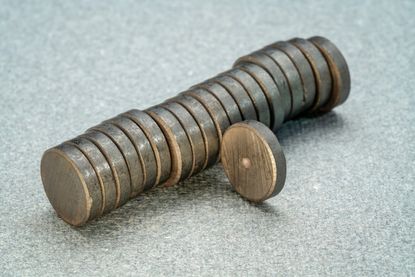This mind-blowing DIY magnet hack shows you where the studs are behind your walls
No stud finder? No problem. This simple hack will show where the studs are behind your drywall with just a magnet


Unless you're a true minimalist, you probably love to adorn your walls with artwork, mirrors and other thoughtful decor. Sometime it's more essential furnishings, like shelving or a wall-mounted TV. However, in most cases, the kind of weekend project that involves mounting something heavy onto your wall involves more than just drilling some screws wherever you please. You need to use a stud finder.
If you're anything like me, at some point in your life you've probably found yourself without one of these handy tools. Instead, you might have found yourself anxiously tapping the surface of your wall in a desperate attempt to hear where the stud frames are, or maybe you tried to estimate their positioning with a tape measure, but the chances are you probably had a small household item lying around that could solve the problem on your behalf. All you need to find the studs behind your drywall is a magnet.

Lilith is an expert at following news and trends across the world of interior design. She's committed to helping readers make the best choices in their homes through writing practical tips and guides to help with all their DIY needs. For this piece she reveals how to use a magnet as a DIY stud finder.
What are studs?
You might be sat there with no idea whatsoever what studs are, in which case, let me lay the groundwork for you. Studs make up the internal framing within our homes that support our wall. They're usually wooden but can sometimes be made of metal.
When carrying out modern decorating ideas that involve fixing heavier weighted items on our walls, they have to be drilled onto these studs, otherwise you risk drilling into the drywall which won't be supportive enough. This can result in the object slowly pulling the screw out over time, or worse, causing it to fall completely.
However, what's useful is that when drywall is fixed to these studs, it's done so using metal screws or fasteners. These come in very handy when it comes to finding the stud framing. The most trusty way to this is with a stud finder, like this one from Amazon, which tend to work by using a magnet to detect fasteners in the drywall and alerting this on a screen. However, there's another method you can still rely on if you don't have one of these tools to hand...

How to make a DIY stud finder
To make a DIY stud finder, all you need is a strong magnet (preferably a small round one) and a piece of string or dental floss.
Next, attach the magnet to the piece of string or floss using a piece of tape (Blu tack will also do the trick). Now, slowly wave the magnet across your wall - you'll notice that it attracts to any screws the other side of the drywall sheet. Wherever the magnet attaches to the wall, you can make a small mark with a pencil.
To save the hassle of finding each stud along the wall, in most cases once you've found one stud location, you can simply measure horizontally across by 16 inches. This is the general spacing for wall studs (and it's the reason for those black diamonds on a tape measure). It's a good idea to test afterwards with your magnet just to be sure.
Now you can safely hang whatever it is you need by drilling anywhere along these markings. Remember that they go all the way up vertically, so you can move it up or down if needed.
A post shared by Jennifer Gizzi | Design & DIY (@makingprettyspaces)
A photo posted by on
Be The First To Know
The Livingetc newsletter is your shortcut to the now and the next in home design. Subscribe today to receive a stunning free 200-page book of the best homes from around the world.

Lilith Hudson is the News Editor at Livingetc, and an expert at decoding trends and reporting on them as they happen. Writing news, features, and explainers for our digital platform, she's the go-to person for all the latest micro-trends, interior hacks, and color inspiration you need in your home. Lilith discovered a love for lifestyle journalism during her BA in English and Philosophy at the University of Nottingham where she spent more time writing for her student magazine than she did studying. After graduating, she decided to take things a step further and now holds an MA in Magazine Journalism from City, University of London, with previous experience at the Saturday Times Magazine, Evening Standard, DJ Mag, and The Simple Things Magazine. At weekends you'll find her renovating a tiny one-up, one-down annex next to her Dad's holiday cottage in the Derbyshire dales where she applies all the latest design ideas she's picked up through the week.
-
 These 12 Best Table Lamps for Your Desk — Perfect Glows for a Creative Home Office
These 12 Best Table Lamps for Your Desk — Perfect Glows for a Creative Home OfficeThe best table lamps for your desk is have a soft, targeted glow. Elevate your WFH set-up with these stylish picks endorsed by Style Editor Brigid Kennedy
By Brigid Kennedy Published
-
 The Nespresso VertuoPlus is 30% Off for President's Day, and it's Kim Kardashian's Coffee Maker of Choice
The Nespresso VertuoPlus is 30% Off for President's Day, and it's Kim Kardashian's Coffee Maker of ChoiceThis sleek and stylish coffee maker was spotted in Kim's home bar, and you can currently save $60 if you buy yours from Amazon
By Lilith Hudson Published

